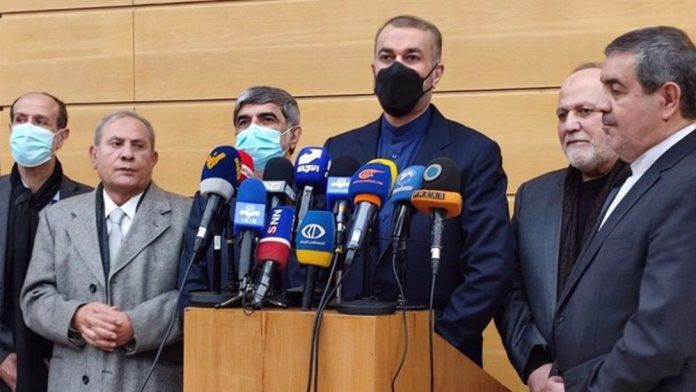The Iranian foreign minister says talks over the revival of the Iran nuclear deal will enter a new stage if Tehran’s red lines are met.
Hossein Amirabdollahian, in a phone conversation with his Omani counterpart Badr Al-Busaid, added Iran is ready for a lasting nuclear deal.
Amirabdollahian also underscored Iran’s goodwill and seriousness about reaching a lasting agreement.
He said after receiving the US response regarding the EU-proposed draft nuclear agreement, if Iran is assured that it will enjoy full economic benefits from the deal and that its red lines are respected, all parties will enter a new stage in Vienna.
The Iranian foreign minister however said no one can talk with certainty about reaching a good and lasting deal before the parties to the negotiations have agreed on all points.
READ ALSO: US: Journalists, lawyers claim CIA spied on them during Assange visit
Amirabdollahian pointed to Oman’s constructive role during the Vienna negotiations aimed at removing anti-Iran sanctions and thanked the Persian Gulf sultanate for its efforts to bring the views of different parties closer.
The top Omani diplomat also expressed hope that all parties to the Vienna talks will make joint efforts toward producing good results.
According to a report, Iran says “relative progress” has been made in the latest round of Vienna talks and that an agreement can be reached if Tehran’s red lines are met.
Speaking at a news conference on Monday, Foreign Ministry spokesman Nasser Kan’ani reiterated Tehran’s long-standing position that it aims to reach a “sustainable and good agreement to remove the unjust sanctions imposed on Iran.”
He reported “relative progress” in the latest round of the talks, but noted that “Iran’s legitimate demands” have not yet been fully met.
Kan’ani added that discussions are underway in Tehran and that “additional opinions” on the European Union’s proposals would be submitted.
Negotiations have been held between Iran and the P4+1 group of countries – Britain, France, Germany, Russia and China – in the Austrian capital since April last year to restore the JCPOA, which was ditched by former US President Donald Trump in May 2018.
Four days of the talks culminated last Monday with a modified text on the table.
While the European Union foreign policy chief Josep Borrell claimed a “final text” had been reached, Iran emphasized it has conveyed its “initial response and reservations” on the draft text.
Kan’ani said consultations are ongoing at the highest level in Tehran, adding, “We are close to an agreement, but it is conditioned on the consideration of Iran’s red lines and the ensuring of the country’s main interests.”
While the parties have noted progress in the talks, the indecisiveness shown by Washington has prevented any significant breakthrough.
The talks began on the US administration of Joe Biden’s pledge to undo its predecessor’s withdrawal from the JCPOA and remove the sanctions Trump slapped on the Islamic Republic.
‘Serious progress in ties with Kuwait’
Commenting on the appointment of a new Kuwaiti ambassador to Iran after six years, Kan’ani said, “We are witnessing a serious development on the path towards the development of ties and cooperation between the two countries.”
He noted that Kuwait’s move could pave the way for further promotion of cooperation between Iran and its neighbors in the Persian Gulf.
Click Here to Read The Original Post
Also: Here













